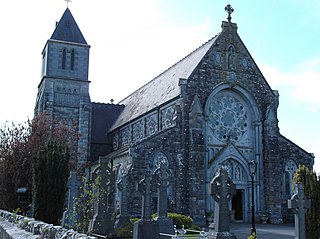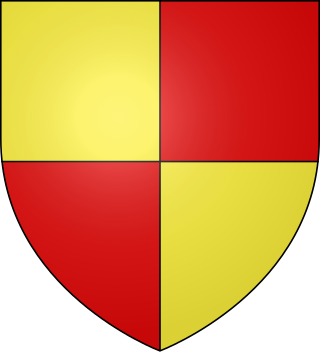The Lord High Chancellor of Ireland was the highest judicial office in Ireland until the establishment of the Irish Free State in 1922. From 1721 to the end of 1800, it was also the highest political office of the Irish Parliament: the Chancellor was Speaker of the Irish House of Lords. The Lord Chancellor was also Lord Keeper of the Great Seal of Ireland. In all three respects, the office mirrored the Lord High Chancellor of Great Britain.

Alexander de Balscot, also known as Alexander Petit was one of the leading Irish clerics and statesmen of the late fourteenth century, who held the offices of Bishop of Ossory, Bishop of Meath, Treasurer of Ireland and Lord Chancellor of Ireland.

Thomas Cantock, Quantock or Cantok was an English-born cleric and judge in medieval Ireland, who held the offices of Bishop of Emly and Lord Chancellor of Ireland.
Sir Laurence Merbury was an English-born statesman in Ireland who held the office of Treasurer of Ireland and was also Deputy to the Lord Chancellor of Ireland.

Thomas Chase, or Chace was a 15th-century judge, scholar and cleric who was Chancellor of the University of Oxford, and subsequently held the office of Lord Chancellor of Ireland.
Walter Fitzsimon or Fitzsimons was a statesman and cleric in Ireland in the reign of Henry VII, who held the offices of Archbishop of Dublin and Lord Chancellor of Ireland.
William Rokeby was a leading statesman and cleric in early sixteenth-century Ireland, who held the offices of Bishop of Meath, Archbishop of Dublin and Lord Chancellor of Ireland. He is commemorated in the Rokeby Chapels in two Yorkshire churches, St Oswald's Church, Kirk Sandall, and Halifax Minster.
Sir Richard Reade (1511–1576) was an English-born judge in sixteenth-century Ireland, who held the office of Lord Chancellor of Ireland.
Robert Wikeford or de Wikeford was an English-born diplomat, lawyer and judge, who became Lord Chancellor of Ireland and Archbishop of Dublin.
Richard Plunkett (c.1340-1393) was an eminent Irish judge and statesman of the fourteenth century, who held the offices of Lord Chief Justice of Ireland and Lord Chancellor of Ireland. His descendants held the titles Baron Dunsany, Baron Killeen and Earl of Fingall.

Sir Richard FitzEustace (c.1380–1445) was an Irish statesman who twice held the office of Lord Chancellor of Ireland.

The De Meones, or de Moenes family were an Anglo-Irish family who originated in East Meon in Hampshire. They moved to Ireland in the late thirteenth century, became substantial landowners in Dublin and Meath, and gave their name to the suburb of Rathmines.

Thomas de Thelwall was an English judge and Crown official who spent part of his career in Ireland, where he held office as Master of the Rolls in Ireland and Clerk to the Privy Council of Ireland. He was Chancellor of the Duchy of Lancaster 1377–78.
John Keppock was an Irish judge of the late fourteenth century, who held the offices of Lord Chief Justice of Ireland, Chief Baron of the Irish Exchequer, and Deputy Lord Chancellor of Ireland. He became a politician of some importance and earned recognition for his loyalty to the English Crown.

Robert de Hemmingburgh was an English-born judge and priest, who held office as Master of the Rolls in Ireland, and possibly as Lord Chancellor of Ireland.
John de Pembroke was a Welsh-born judge who held several senior offices in Ireland, including that of Chancellor of the Exchequer of Ireland.
Sir Thomas Fitz-Christopher Plunket (c.1407–1471) was a leading Irish lawyer and judge of the fifteenth century who held office as Lord Chief Justice of Ireland. He was an ancestor of the Duke of Wellington in the female line. His second marriage to the heiress Marian Cruise inspired the ballad The Song of Mary Cruys.
Events from the year 1371 in Ireland.
Nicholas de Meones or de Moenes was an Irish judge of the fourteenth century. He had a somewhat turbulent career, due to his political partisanship, and was briefly imprisoned on a charge of treason.

William de Beverley, Le Buerlaco, or de Burlaco was a senior English Crown official and judge of the reign of King Edward I of England. He held high public office, and spent his last years in Ireland as Lord Chancellor of Ireland.









